Intro
Discover chronic dehydration symptoms, including fatigue, headaches, and dry skin. Learn to identify and manage dehydration causes, effects, and treatment options for optimal hydration and overall health.
Chronic dehydration is a condition that affects millions of people worldwide, yet it often goes unnoticed or misdiagnosed. The importance of proper hydration cannot be overstated, as water plays a crucial role in maintaining various bodily functions, such as regulating body temperature, transporting nutrients, and removing waste products. When the body loses more fluids than it takes in, it can lead to a range of symptoms that can significantly impact daily life. In this article, we will delve into the world of chronic dehydration, exploring its symptoms, causes, and consequences, as well as providing valuable insights into prevention and treatment.
The human body is composed of approximately 60% water, which is essential for maintaining proper bodily functions. Even mild dehydration can cause symptoms such as headaches, fatigue, and difficulty concentrating. Prolonged dehydration, on the other hand, can lead to more severe symptoms, including dizziness, nausea, and muscle cramps. If left untreated, chronic dehydration can have long-term consequences, such as kidney damage, digestive problems, and even increased risk of certain diseases. It is essential to recognize the symptoms of chronic dehydration and take proactive steps to prevent and treat this condition.
Chronic dehydration can be caused by various factors, including inadequate fluid intake, excessive sweating, certain medical conditions, and medications. Some people may be more prone to dehydration due to their lifestyle, such as athletes, individuals working outdoors, or those living in hot and humid climates. Additionally, certain medical conditions, such as diabetes, kidney disease, and heart failure, can increase the risk of dehydration. It is crucial to understand the causes of chronic dehydration to develop effective prevention and treatment strategies.
Understanding Chronic Dehydration
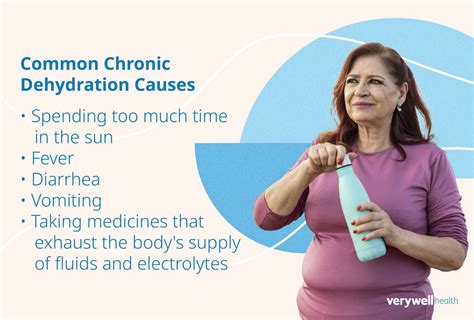
Chronic dehydration is a complex condition that can manifest in different ways. It is essential to recognize the symptoms and understand the underlying causes to develop effective treatment plans. Some common symptoms of chronic dehydration include:
- Fatigue and weakness
- Headaches and migraines
- Dry mouth and throat
- Dizziness and lightheadedness
- Constipation and digestive problems
- Muscle cramps and joint pain
- Skin problems, such as acne and eczema
- Hair loss and brittle nails
- Decreased cognitive function and memory
Causes of Chronic Dehydration
Chronic dehydration can be caused by various factors, including: * Inadequate fluid intake * Excessive sweating * Certain medical conditions, such as diabetes, kidney disease, and heart failure * Medications, such as diuretics and laxatives * Climate and environment, such as hot and humid weather * Lifestyle factors, such as physical activity and travelRecognizing the Symptoms
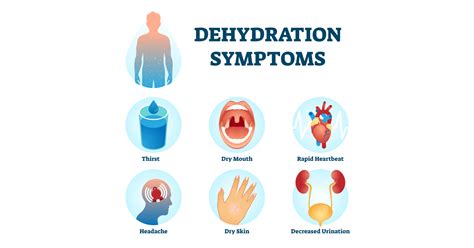
Recognizing the symptoms of chronic dehydration is crucial for early detection and treatment. Some people may experience mild symptoms, while others may exhibit more severe signs. It is essential to pay attention to changes in bodily functions, such as:
- Urine output and color: Dark yellow or brown urine can indicate dehydration
- Thirst and hunger: Excessive thirst and hunger can be signs of dehydration
- Energy levels: Fatigue and weakness can be symptoms of dehydration
- Skin elasticity: Decreased skin elasticity can indicate dehydration
- Cognitive function: Decreased cognitive function and memory can be signs of dehydration
Consequences of Chronic Dehydration
Chronic dehydration can have severe consequences if left untreated. Some potential consequences include: * Kidney damage and disease * Digestive problems, such as constipation and irritable bowel syndrome * Increased risk of certain diseases, such as kidney stones and urinary tract infections * Decreased cognitive function and memory * Skin problems, such as acne and eczema * Hair loss and brittle nailsPrevention and Treatment
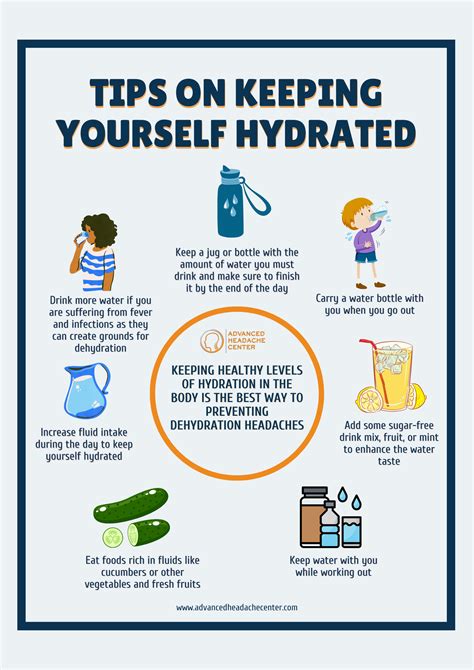
Preventing and treating chronic dehydration requires a comprehensive approach. Some strategies include:
- Drinking plenty of water and other fluids
- Eating hydrating foods, such as fruits and vegetables
- Avoiding excessive sweating and heat exposure
- Managing underlying medical conditions
- Avoiding medications that can cause dehydration
- Practicing good hygiene and sanitation
Hydration Tips
Some valuable hydration tips include: * Drinking at least eight glasses of water per day * Eating hydrating foods, such as watermelon and cucumbers * Avoiding sugary drinks and caffeine * Drinking water before and after exercise * Monitoring urine output and colorManaging Chronic Dehydration
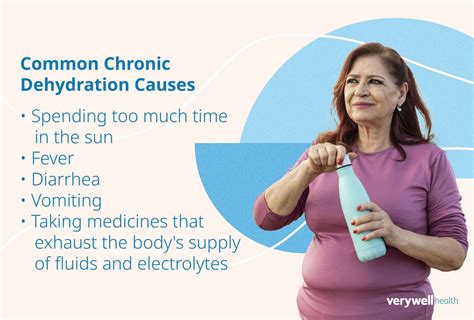
Managing chronic dehydration requires a long-term commitment to hydration and healthy lifestyle habits. Some strategies include:
- Developing a hydration plan, including drinking plenty of water and eating hydrating foods
- Monitoring urine output and color
- Avoiding excessive sweating and heat exposure
- Managing underlying medical conditions
- Practicing good hygiene and sanitation
Seeking Medical Attention
If symptoms of chronic dehydration persist or worsen, it is essential to seek medical attention. A healthcare professional can: * Diagnose underlying medical conditions * Develop a personalized treatment plan * Monitor progress and adjust treatment as needed * Provide guidance on hydration and healthy lifestyle habitsConclusion and Next Steps
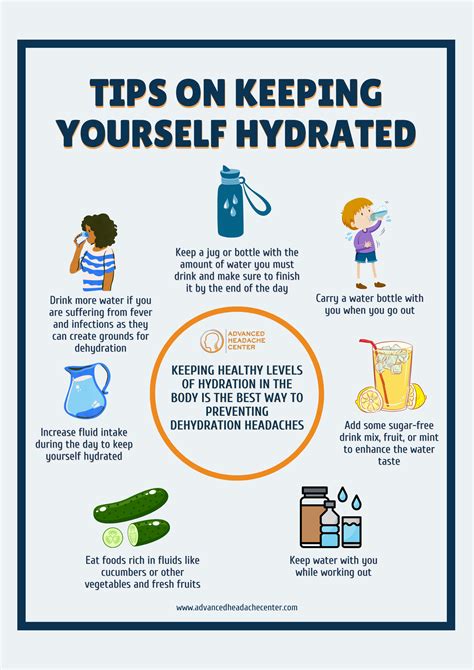
In conclusion, chronic dehydration is a complex condition that requires attention and action. By understanding the symptoms, causes, and consequences of chronic dehydration, individuals can take proactive steps to prevent and treat this condition. It is essential to develop a comprehensive approach to hydration and healthy lifestyle habits, including drinking plenty of water, eating hydrating foods, and managing underlying medical conditions. If symptoms persist or worsen, it is crucial to seek medical attention to develop a personalized treatment plan.
We invite you to share your thoughts and experiences with chronic dehydration in the comments below. Have you or a loved one struggled with dehydration? What strategies have you found helpful in preventing and treating this condition? Share your story and help others understand the importance of hydration and healthy lifestyle habits.
What are the most common symptoms of chronic dehydration?
+The most common symptoms of chronic dehydration include fatigue, headaches, dry mouth and throat, dizziness, and constipation.
How can I prevent chronic dehydration?
+To prevent chronic dehydration, drink plenty of water, eat hydrating foods, avoid excessive sweating and heat exposure, and manage underlying medical conditions.
What are the consequences of untreated chronic dehydration?
+Untreated chronic dehydration can lead to kidney damage, digestive problems, increased risk of certain diseases, and decreased cognitive function.
How can I manage chronic dehydration?
+To manage chronic dehydration, develop a hydration plan, monitor urine output and color, avoid excessive sweating and heat exposure, and manage underlying medical conditions.
When should I seek medical attention for chronic dehydration?
+If symptoms of chronic dehydration persist or worsen, seek medical attention to develop a personalized treatment plan and address underlying medical conditions.
